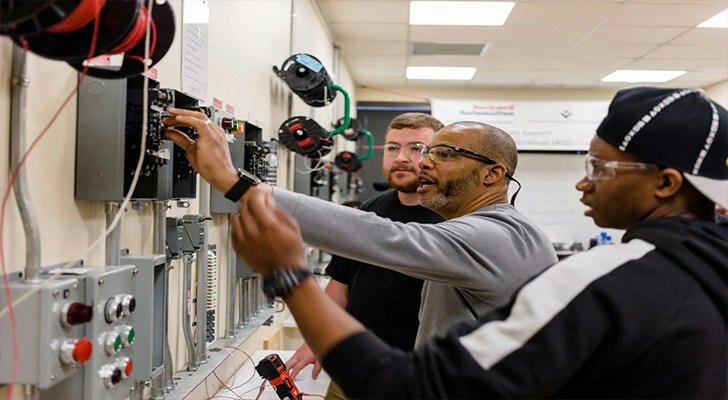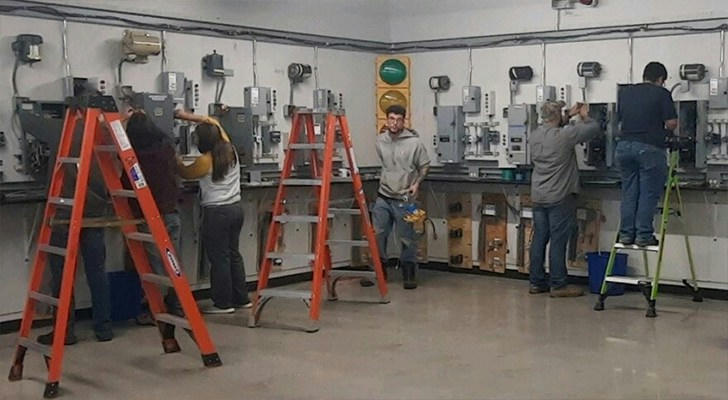Train to Be an Electrician — High Demand, Great Pay!
If you’re looking for a career that offers job security, solid income, and hands-on work, becoming an electrician might be the perfect fit. Across the United States, electricians are in high demand, and the path to getting trained is more accessible than ever. Whether you’re a recent high school graduate, someone changing careers, or just tired of working jobs with no future, electrician training can open doors to a stable and rewarding profession.
In this article, we’ll walk you through what electricians do, why the job is in such high demand, what training involves, and how you can get started — even with no prior experience.

Why Electricians Are in High Demand
Electricians are essential to nearly every part of modern life. From installing wiring in new homes to maintaining power systems in hospitals, schools, factories, and offices — electricians keep the lights on and the power running.
Here’s why the need for electricians is growing fast in the U.S.:
- Aging workforce: Many current electricians are nearing retirement age.
- Growing population: More homes, buildings, and infrastructure are being built.
- Green energy: Solar panels, electric vehicles, and smart homes all require specialized electrical skills.
- Skilled trades shortage: Fewer young people are entering trades, making trained electricians more valuable than ever.
According to the U.S. Bureau of Labor Statistics, jobs for electricians are expected to grow steadily over the next decade. This means if you’re trained, licensed, and reliable, you’re likely to find steady work — and good pay — for years to come.
How Much Do Electricians Make?
One of the best parts of becoming an electrician is the earning potential. In 2024, the median pay for electricians in the U.S. was about $60,000 per year, and experienced electricians can earn well above that, especially in cities or in specialized fields.
Apprentices usually start out earning 40–50% of a full electrician’s wage, but as you complete your training and gain experience, your pay increases. Many electricians also receive:

- Overtime pay
- Health insurance
- Retirement plans
- Union benefits (if applicable)
Plus, if you decide to become a licensed contractor or start your own business, your income potential goes even higher.
What Do Electricians Actually Do?
Electricians handle anything related to electrical systems — from small residential jobs to large commercial projects. Depending on where you work and what you specialize in, your tasks might include:
- Installing and repairing wiring
- Reading blueprints and electrical diagrams
- Setting up lighting, power outlets, and circuit breakers
- Ensuring systems meet local electrical codes
- Troubleshooting and solving power issues
- Installing smart home systems, solar panels, or electric vehicle charging stations
It’s a career that combines technical knowledge, problem-solving, and hands-on skills. And it never gets boring — every job is a little different.
How to Become an Electrician
You don’t need a four-year college degree to become an electrician. In fact, you can often start training right after high school or as an adult learner.
Here are the basic steps:

1. Get a High School Diploma or GED
This is usually the minimum requirement. Math, science, and shop classes are helpful but not required.
2. Enroll in an Electrician Training Program
You can find programs at:
- Trade schools or technical colleges
- Community colleges
- Apprenticeship programs through unions or companies
These programs typically cover:
- Electrical theory and safety
- National and local electrical codes
- Tools and equipment
- Hands-on training in real-world scenarios
Some programs last 6–12 months, while others (like apprenticeships) can last 4–5 years — but you’re often earning money while you learn.
3. Start an Apprenticeship
This is the most common path. Apprenticeships combine classroom instruction with paid on-the-job training. You’ll work under the supervision of licensed electricians, learning by doing.
You can apply for apprenticeships through:
- Local electrician unions (like the IBEW)
- Non-union contractors
- Online job boards and training websites
4. Get Licensed
Most states require electricians to pass an exam to become licensed or certified. This ensures you know the safety standards and codes needed to do the job legally and correctly.
What Makes a Good Electrician?
You don’t need to be a math genius or a bodybuilder to succeed as an electrician. But certain qualities will help you thrive in this career:
- Problem-solving skills – You’ll often need to figure out what's wrong and how to fix it.
- Attention to detail – Safety and precision are key.
- Physical fitness – You’ll be on your feet, climbing ladders, or working in tight spaces.
- Willingness to learn – Technology and codes change regularly.
- Good communication – You’ll work with customers, contractors, and team members.
If you enjoy working with your hands, solving problems, and seeing the results of your work, this could be the career for you.
Career Paths and Opportunities
Once you’re licensed and have some experience, you can specialize or branch out into different roles:
- Residential Electrician – Work in homes and apartments
- Commercial Electrician – Handle wiring in stores, offices, and schools
- Industrial Electrician – Work in factories or power plants
- Maintenance Technician – Keep electrical systems running smoothly
- Electrical Inspector – Ensure buildings meet safety codes
- Electrical Contractor – Start your own business
There’s room to grow, and the skills you learn are useful anywhere in the country.
Final Thoughts
Electricians are the backbone of modern life — and they’re only becoming more important as our world becomes more powered, connected, and electrified. If you’re looking for a career that offers great pay, job security, real-world skills, and long-term opportunity, electrician training is a smart investment in your future.
So don’t wait.
Train to Be an Electrician — High Demand, Great Pay!
Your future is just one wire away from being fully charged.
